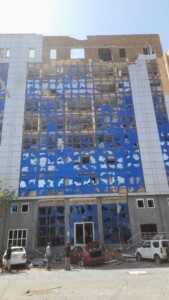Sudan’s media laws to be amended within six months
There will be no further prosecutions under the laws designed to curb the press passed by the deposed Al Bashir regime and Sudan’s media laws are to be amended within a maximum of six months.
 Newspaper vendors in Khartoum (File photo)
Newspaper vendors in Khartoum (File photo)
According to the Sudanese Ministry of Culture and Information, Sudan’s media laws will be amended within six months. There will be no further prosecutions under the laws designed to curb the press passed by the deposed Al Bashir regime.
“We will not use the unjust laws that were used against us [by the Al Bashir regime]”, the first undersecretary of the Sudanese Ministry of Culture and Information asserted during a workshop on media legislation in Khartoum on Monday.
Undersecretary El Rashid Yacoub said that “the new transitional government will not allow those who try to exploit the democratic atmosphere and the current freedom of press in the country to overthrow or undermine the newly established democratic system”.
He pointed out that although the laws that the former regime used against the press still exist on the statute books “we will not use them”.
El Rashid: “Only a fool thinks that they will use this transitional democratic situation to break the will of the Sudanese people… the [transitional] government will not resort to the use of the unfair and unjust laws that were used against the Sudanese people and violated their rights.”
The undersecretary verified that there is a plan to amend laws and legislation within a maximum period of six months.
'Free and effective media'
Minister of Culture and Information, Feisal Mohamed Saleh affirmed that the government wants a free and effective media that is capable of monitoring the government apparatus, assuring transparency, and exposing corruption wherever it exists.
However, he said “for such a task to be carried out efficiently there need to be laws, policies, and qualifications as well as training”.
He emphasised that this transitional period is a phase of training and reform, that “focuses primarily on issues of peace, democratic transformation and freedom of expression as well as the reinforcement of women and children’s rights and environmental issues”.
'Institutional reforms needed'
During the workshop, the British Ambassador to Khartoum, Irfan Siddiq stated that the rights of journalists should be a priority for the transitional government as those rights are even more important in this period. He further emphasised that democratic and institutional reform should be done during this transitional period.
Ambassador Siddiq also suggested that the Sudanese media should reflect the diversity in the country and highlighted the importance of the accessibility of media and broadcasting services within a regulatory and legal framework that includes free access for all people.
Radio Dabanga’s editorial independence means that we can continue to provide factual updates about political developments to Sudanese and international actors, educate people about how to avoid outbreaks of infectious diseases, and provide a window to the world for those in all corners of Sudan. Support Radio Dabanga for as little as €2.50, the equivalent of a cup of coffee.












 and then
and then